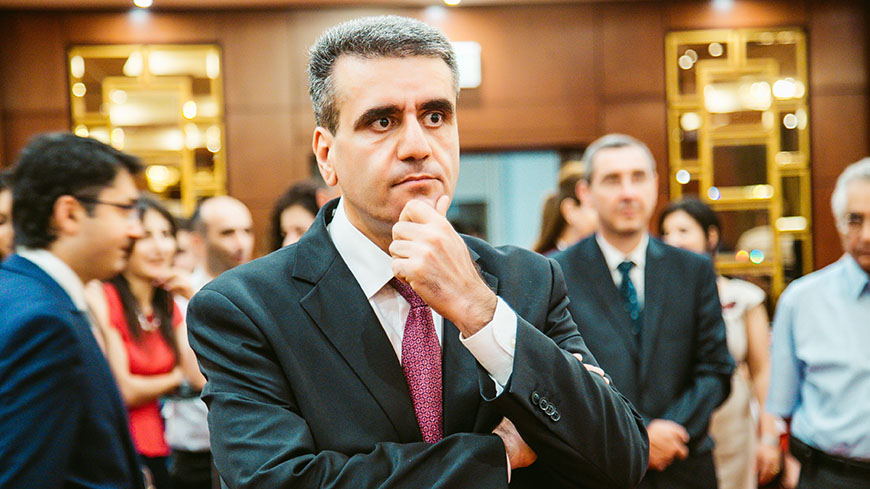PGG Project “Supporting the criminal justice reform and harmonising the application of European standards in Armenia”
Armenia’s joining the ECHR Superior Courts Network contributes to better protection of rights.
“Armenia joined the Protocol number 16 to the European Convention on the Protection of Human Rights and Fundamental Freedoms in 2016, which entered into force in 2018”, said Yervand Khundkaryan, Head of the Cassation Court of Armenia, who at the moment of publishing the article has been newly elected as a member of the Constitutional Court.
“By signing the Protocol, Armenia ensured the enhancement of the interaction between the European Court of Human Rights (ECtHR) and other member states of the Council of Europe with the country's judicial authorities to receive advisory opinions”, said Khundkaryan. He added that in the framework of this Protocol a Superior Courts Network of the ECtHR was established with the appointed two focal points from the Civil Court of Appeal and the Court of Cassation of Armenia, who are responsible for ensuring the co-operation within the Network.
“For all the questions that we might have, our focal point first makes a research and negotiates with the assigned representative from the European Court, and then reports to the Cassation Court”, he said. “These primarily concerns the cases which show discrepancy between Armenian and European legislation, and also precedent decisions”.
According to Ashkhen Gharslyan, Head of the legal expertise service of the Court of Cassation of Armenia, who was assigned as a focal point to the Network, Armenia is benefiting a lot from such an established co-operation and partnerships with both the ECtHR and other member States’ highest courts representatives.
The Network enables a member State to receive consultations and get a clear and unambiguous position of the ECtHR on controversial issues and judicial precedents. The platform allows to get in contact with around 90 focal points from Council of Europe member States in order to exchange experiences. “I personally have such a co-operation with my Bosnian colleague, which I met during the Forum organised last year in Strasbourg”, said Gharslyan.
She told that every week the representative of the ECtHR sends the case law of the Court to be aware of the judicial precedents in “non-standard” decisions made in the Court on a range of cases, including legal and civil rights, family issues and children adoption. “Particularly, legislative measures regarding the court cases on secret testimony and migration are the focus topics where we exchange the practice”, said Gharslyan.
The platform serves as a research of the case laws and consultations to understand whether in general it might be reasonable to take a case to the European Court.
“The case law of the Cassation Court should be in compliance with the case law of the ECtHR. In this term, this will naturally decrease the number of appeals to the European Court”, said Gharslyan. “This will generally contribute to a better protection of human rights in Armenia. These are our objectives, and therefore, the dialogue in the Network is a very effective tool for our practice”.
The PGG Project “Supporting the criminal justice reform and harmonising the application of European standards in Armenia” aims at supporting Armenia in the criminal justice reform and alignment of the national legislation with the European standards taking into account the case law of the ECtHR.
The project is providing expert advice in the process of formulating and applying criminal and criminal procedure policy by key justice sector stakeholders. Special attention is being paid to the issues highlighted by the Council of Europe monitoring mechanisms. These include, but will not be limited to, the prevention of ill-treatment and impunity, application of pre-trial detention, procedural guarantees in the criminal procedure in line with the Council of Europe standards and the case law of the ECtHR.
Under the PGG project a number of capacity building activities were conducted and according to Khundkaryan, “These events gathered together the Armenia judges, prominent scholars, legal practitioners and civil society representatives to discuss the achievements and challenges faced by the Civil and Criminal Courts of Appeals”, said Khundkaryan. He added that the participants also discussed the best practices of the Council of Europe member States, which would ensure better exercise of the functions of the Superior Courts for the protection of human rights and freedoms.
“Every year we have around five thousand appeals, and the most interesting cases and precedent decisions are being summarised in the publication of the book, which is issued annually with the support of the Council of Europe”, he said, noticing that justice will be only benefiting if this information will be accessible to both the judicial community and public in general.

